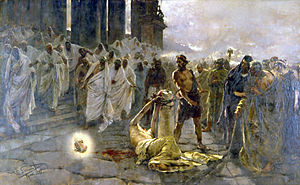 |
| Beheading of St. Paul, Alessandro Algardi |
Colossians 1:24-28
I now rejoice in my sufferings for you, and fill up in my flesh what is lacking in the afflictions of Christ, for the sake of His body, which is the church, of which I became a minister according to the stewardship from God which was given to me for you, to fulfill the word of God, the mystery which has been hidden from ages and from generations, but now has been revealed to His saints. To them God willed to make known what are the riches of the glory of this mystery among the Gentiles: which is Christ in you, the hope of glory. Him we preach, warning every man and teaching every man in all wisdom, that we may present every man perfect in Christ Jesus.
I am no "Dear Abby" or "Anne Landers" (thanks to the Lifetime Network I now know that they were actually sisters), but allow me to take this time to respond to a comment from a reader. The reader is Justin, a friend of mine that I regularly discuss the blog and other spiritual matters with (like which Three Six Mafia songs are the greatest). His comment was about a discussion we had outside of the blog and my blog entry about Vincent Van Gogh. The common thread between the two was the subject of Suffering. Suffering is a great mystery, not because we don't go experience it but because we don't discuss it. Silence is the conduit of Ignorance and the comrade of Suffering.
"Recently, you... warned me that his message of the "Prosperity Gospel" was flawed in that it suggest that we do not have to suffer. Or that our suffering will always be short-lived if we just pray. You mentioned how the Bible depicts the suffering of people like Paul and that there may be a need for our suffering. I thought about that and remembered what Paul says in Romans 5:3 - 4, "suffering produces perseverance; perseverance, character; and character, hope." Examining that and so many other examples within Scripture (Job, John the Baptist, David, Daniel, etc.), it almost seems as though it is better to suffer; that is, better rewards are reaped from those who suffer. These examples, among others, perhaps inspiring such rhetoric as: "God gives His toughest battles to His strongest soldiers." So is it true? Is it better to suffer? And if so, is there a difference in how we should respond when the sufferings are brought on by our own iniquities versus those caused by others?"
- Justin
Even though I responded to this comment earlier, I think that today's Scripture refers to it as well. Justin is correct in his assessment that some suffering is brought on by others and some is brought on by ourselves. Most suffering actually falls under a third category: things that happen for reasons unknown to us. In Colossians Paul speaks of a certain type of suffering: persecution. Paul spoke about persecution from the perspective of one who was suffering from it. Paul was punished and imprisoned on several occasions for spreading the Gospel. In the end of the book of Acts we find him on house arrest and awaiting a Roman trial. Tradition holds that Paul eventually lost his life to religious persecution. He was martyred by beheading in Rome.
 |
| The Beheading of St. Paul, Enrique Simonet |
Persecution always has those three ingredients: the victim, the aggressor and the viewer. Sometimes the persecution turns in the direction of the viewer when he refuses to remain just a viewer. St. Paul spoke about the persecution that comes as a result from doing what is right. When that viewer chooses to act on behalf of the victim. I remember back in the days when I and my wife were dating. We would often go to Blockbuster and pick up a few movies (yes, I'm old). They would include a comedy, a chick flick (a chick flick is by definition any movie featuring a scene with Hugh Grant) and something that featured serious, dramatic acting. One the serious movie that we picked up was Hotel Rwanda. This film starring Don Cheadle tells the true story of Paul Rusesabagina a Rwandan hotel manager who found himself in the middle of the ethnic/tribal unrest and genocide that gripped his country in the mid 90's. He stopped just viewing the problem and chose to act by housing refugees. Altogether he was able to save of 1,268 lives, before he and his family fled to Belgium. I know all of this because of Wikipedia, not the movie. My wife and I could not bring ourselves to actually watch the film. We actually rented it several times with the same result. The United States and other Western powers have been criticized often about not mustering the political will to act to end the Rwandan genocide that took five hundred thousand to one million lives. I am as guilty as any Westerner because I, unlike Paul Rusesabagina, could not even bring myself to even view persecution let alone act out against it.
When St. Paul discusses the persecution that he suffers he speaks of it as if it is something that has a hopeful potential He seems to view it as something that can facilitate a greater good. Paul's suffering was not just for a good cause but it was for God's cause. Through out the ages there have been many Christians who suffered like Jesus for the cause of Jesus. Some like St. Patrick were victorious in converting those who were once against them. Others like Polycarp met their death as martyrs. St. Paul understood ahead of time what Tertulian would later write, "The blood of the martyrs is the seed of the Church." Suffering and persecution is nothing to be pursued for the sake of pursuing it. Trouble should not be sought out: if needs be, trouble will find you. However when persecution does occur to the Church, it seems to act as a fuel for deeper commitment. This isn't just an ancient phenomenon but one that still occurs around the world in places where the Gospel is still repressed by government or cultural pressure. In cases like this the Holy Spirit turns viewers in the crowd into believers and victims into legends.
The power of persecution does not lie in the hands of the aggressor... even as he takes power away from the victim. The power lies in the fact that the Gospel is repugnant to Oppression. The Cross was forged in the Baptism of Fire and is now repellent to the flames of persecution and when the smoke clears Truth wins out. Truth wins out when we share about suffering. Truth wins out when we stop viewing and start acting. Truth wins out when we embrace that suffering for the sake of the Gospel is yet only temporary when compared to the gift of eternal life. Suffering is not good but it can birth much good if we speak out and act out for Truth. Truth can never remain silenced, oppressed, punished or murdered because Truth has the power to rise again from the dead.
















